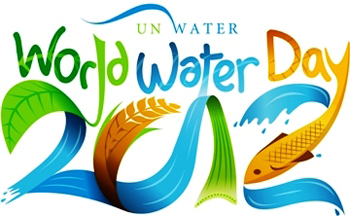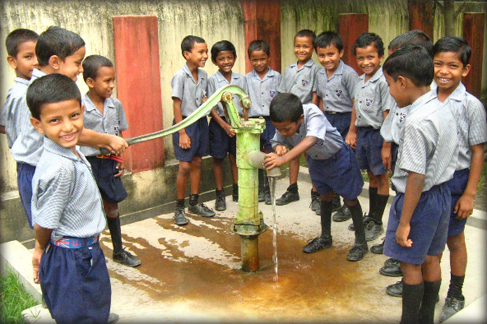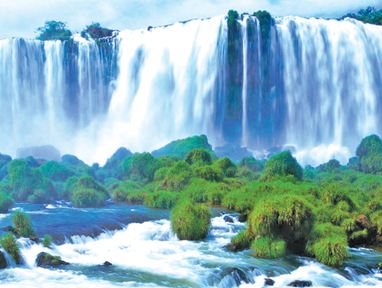|
 Today is World Water Day: Today is World Water Day:
Every drop counts!
By Pramod de Silva
Water is the essence of life. We cannot exist without liquid water.
In fact, no living being can exist without this magical combination of
hydrogen and oxygen. Across the universe, there could be many other
planets with liquid water where life thrives in some form.
Today, people around the globe mark World Water Day (WWD). It was in
1993 that the United Nations General Assembly designated March 22 as the
World Water Day. It is a day to celebrate water which is at the core of
sustainable development. This year will also mark the culmination of the
International Decade for Action ‘Water for Life’ which began in 2005.
Water resources, and the range of services they provide, underpin
poverty reduction, economic growth and environmental sustainability.
From food and energy security to human and environmental health,
water contributes to improvements in social well-being and inclusive
growth, affecting the livelihoods of billions. Water is the foundation
of health, food and agriculture, energy, nature, industry and
development.
Water appears to be an infinite resource, but if we continue to
mismanage the world’s water, especially freshwater, the world will be in
for a severe water shortage in the coming years. Water makes up more
than 75 percent of our planet, but freshwater amounts to only a fraction
of this vast amount of water.
Desalination plants are extremely expensive and are not an option for
most countries, especially landlocked ones.
It is thus vital to preserve the world’s freshwater resources and use
it in a sustainable manner. Globally, agriculture and livestock sector
is the largest user of water, accounting for 70% of total usage.
Swimming pool
Did you know that more water is needed to make a car than to fill a
swimming pool? Did you know that 15,000 litres of water are needed to
produce just 500 grammes of meat? Even more shockingly, seven litres of
water are needed to make a one litre plastic bottle containing water.
These are just two statistics that prove just how much water is needed
even for things that are not normally associated with water right away.
 In his message on WWD 2015, UN Secretary General Ban Ki-moon
highlighted why global action is necessary to conserve water. “The onset
of climate change, growing demand on finite water resources from
agriculture, industry and cities, and increasing pollution in many areas
are hastening a water crisis that can only be addressed by cross-sectoral,
holistic planning and policies - internationally, regionally and
globally.” The UN and other agencies plan to make clean water available
to all seven billion people at least by 2030. In his message on WWD 2015, UN Secretary General Ban Ki-moon
highlighted why global action is necessary to conserve water. “The onset
of climate change, growing demand on finite water resources from
agriculture, industry and cities, and increasing pollution in many areas
are hastening a water crisis that can only be addressed by cross-sectoral,
holistic planning and policies - internationally, regionally and
globally.” The UN and other agencies plan to make clean water available
to all seven billion people at least by 2030.
Accessibility
It is still not a question of the availability of water, but rather a
question of accessibility. Despite progress under the Millennium
Development Goals (MDGs), adopted in 2000, some 750 million people -
more than one in 10 of the world’s population - remain without access to
an improved water supply. Women and children, in particular, are
affected by this as hours are wasted in the unproductive and sometimes
dangerous task of collecting water from miles away.
An estimated 1.8 billion people worldwide drink water that is
contaminated by human and animal waste, according to the WHO/UNICEF
Joint Monitoring Program for Water Supply and Sanitation. But access to
clean drinking water alone is not enough. Water is essential for
sanitation. More than 2.5 billion people still live without improved
sanitation, and a billion people practise open defecation. Little
success has been made in this particular set of MDGs but researchers are
working on technologies that could bring pure water to more communities.
For example, researchers at the Purdue University, Indiana, USA, have
devised a system that continuously disinfects water using solar UV
radiation which damages waterborne pathogens’ nucleic acids and proteins
so that they cannot replicate or cause infections.
Moreover, the system is suitable for areas in the developing world
which do not have electricity as the system controls water flow without
requiring electrical energy.
Impact
Another factor affecting the Earth’s supply of water is climate
change. Greenhouse gas emissions will have to significantly decline to
avert the worst impacts of climate change, which include changed weather
patterns and the threat of water scarcity in large parts of the world.
Climate change negatively impacts fresh water sources. Current
projections show that freshwater-related risks rise significantly with
increasing greenhouse gas emissions, aggravating competition for water
among all users, affecting regional water, energy and food security.
Some parts of the world are already feeling the effects of a severe
water shortage. According to the Los Angeles Times, “right now the state
of California has only about one year of water supply left in its
reservoirs, and our strategic backup supply, groundwater, is rapidly
disappearing.
|

Cool cascades of fresh falling water |
California has no contingency plan for a persistent drought like this
one (let alone a 20-plus-year mega-drought), except, apparently, staying
in emergency mode and praying for rain.”
That is apparently the last resort for people in many areas who have
not experienced rain for years. Rainfall patterns have changed,
affecting many ecosystems whose water cycle is essential to sustain
life. The cutting down of forests and the construction of dams without
heeding environmental concerns have made matters worse.
Development itself may affect the groundwater tables, as demonstrated
by the Uma Oya project here in Sri Lanka.
Freshwater
It is essential to make prudent use of the world’s freshwater
resources, one step at a time.
This should start at individual level where each person can make an
effort to cut down on the personal consumption of water. For example,
you can turn off the tap when you brush your teeth - this can save six
litres of water per minute. Use a watering can to water your plants
instead of using the hose which can output a staggering 1,000 litres per
hour.
You can even take a shorter shower - a showerhead can use anything
between six and 45 litres per minute. One can imagine the savings if
these actions are magnified society wide.
Saving water is not difficult at all but needs a firm commitment from
individuals, corporates and governments.
Development will only be possible if we use our dwindling water
resources in a sustainable manner. |

